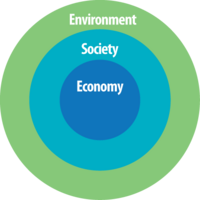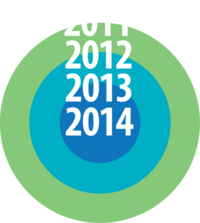Stenz/FAQ
Contents
I want to integrate sustainability into my teaching - where should I start?
There are three aspects to teaching for sustainability:
- Operations
- Content
- Process
Operations involves how the course operates in terms of sustainability, e.g. how much printed material do the students get, what is re-used, recycled, how flexible is the teaching, etc.
Content is simply the sustainability issues applicable to the subject area included in the teaching of the subject.
Process is how this content is taught. The process for teaching people to become sustainable practitioners includes experiential learning, student driven/negotiated aspects of the learning and teaching for action competence - the ability to take action to make change.
In integrating sustainability the first step is to look at the operational practices, including your personal teaching practices and pedagogy. Role modeling is one of the most powerful tools for educating others. It is how we innately learn, children learn how to live and behave through watching older children.
The next step is to make these sustainable operational practices explicit in your teaching. Explain why you are operating in this way, how it affects the students and how the students can choose to operate in these ways too.
Subject specific sustainability content: Integrating sustainability content into your teaching will involve some research into the concept of sustainability and links with your subject area.
E.g. I teach Maths. What's that got to do with sustainability?
One example here is that Climate science is largely mathematical. A climate change example maybe used to teach a mathematical concept so not only are students learning the maths they are also learning about climate change.
If integrating sustainability content doesn't seem to link with your subject area, firstly do a little more research, then look at how it a sustainability issue could be used as a context for teaching your subject.
Lastly, the process of teaching for sustainability is probably the hardest to integrate as it involves questioning our current teaching practices, looking at ways for students to take ownership and be involved in the development of their learning and teaching through practical experiences or classroom based activities that mimic these. The idea in the process of teaching for sustainability is that you are facilitating the development of people to question things and act to make change on issues.
Another difficultly often faced in engaging in this process of teaching is that our students are not used to being asked for their input into what they learn and how they learn it. They're often not used to having to be practically involved in their own learning and often prefer us to 'give' them the information. Due to this situation it is important to ease your student into this process.
Initially students will need to learn to work cooperatively and closely with others on group projects. This will involve you facilitating around communication issues and dealing with clashes and compromise within a group. It also involves planned experiential activities with facilitated reflection on the learning, knowledge as a process, transformative teaching that helps to shift peoples thinking on broad concepts. It's about challenging and questioning norms and assumptions and about working and learning with your students. Teaching in this way builds students' ability to then take ownership of and drive their own learning experiences. At this level teachers need to be willing to negotiate how a class operates and what they learn within the parameters of the course learning outcomes.
Who's behind STENZ?
The short version: STENZ is a pivotal initiative within the NZDESD programme of activities. The work of STENZ has been made possible through the partnership between the New Zealand National Commission for UNESCO and SANZ.
The longer version: The New Zealand National Commission for UNESCO is responsible for the United Nations Decade of Education for Sustainable Development (UNDESD) in NZ. SANZ (through its Partnership Agreement with NZ National Commission for UNESCO) is responsible for coordinating and giving impetus to the programme of activities within the New Zealand UN Decade of Education for Sustainable Development. The scope of those activities is outlined in the NZDESD Strategic Plan. STENZ is a pivotal initiative within the NZDESD programme of activities.
How can I get involved in STENZ?
Do you really mean every graduate?
What is strong sustainability?
Paper from SANZ: Sustainability for New Zealand: Principles and Scenarios.
A long term sustainable global society must have stable physical relationships with its surrounding ecosphere. The exchange of material and energy between society and ecosphere must be sustainable. The manipulation of nature by society must be subject to these limitations.


